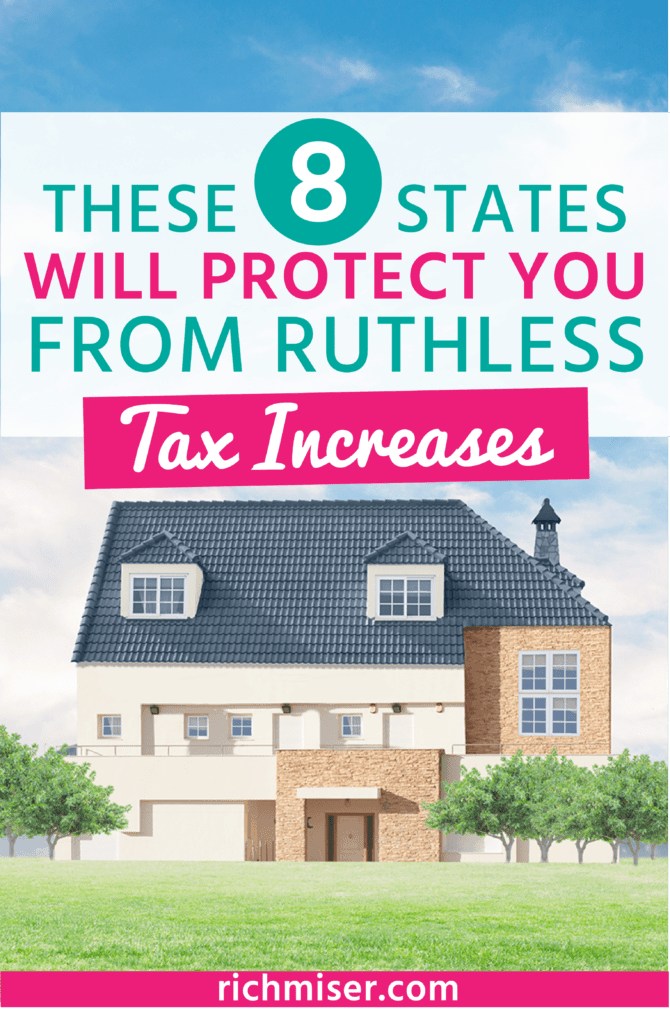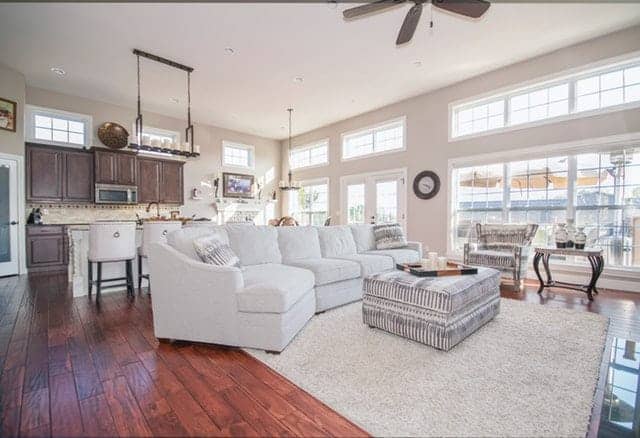One of the things I most hate as a homeowner is property tax increases.
It is one of my big sources of grief and fear, because, unlike income taxes, they’re not adjusted depending on whether I make more or less money. And unlike sales taxes, I can’t reduce them by buying less stuff.Like college or medical costs, they’re one of those expenses that can rise without regard to your ability to pay, and effectively price you out of your own home.
To tame this ruthless beast, many states have provided for property tax relief by implementing caps that limit how much your taxes can rise. That way, if you move to a house that’s initially worth $250,000 but later appreciates to $750,000, you won’t be paying taxes as if you had bought it for $750,000.
And that’s what I want to go over today: the states that offer you the most protection, and those that might leave you twisting in the wind. Here goes (with research from the Tax Foundation)*.
8 States That Will Give You Comprehensive Property Tax Relief
Before I list the states, let me take a brief detour to define what I mean by comprehensive property tax relief. It’s caps on the assessment, rate, and levy (all three).
Assessment Caps
An assessment cap limits the increases in your home’s assessed value. For example, let’s say that your house is worth $100,000, and your annual taxes are 1.5%, plus there’s an annual assessment cap of 5%. So, the first year, you paid $1,500 in taxes (1.5% of $100,000).
Then, suppose they decided to build a casino nearby, and property values rise dramatically, to where your house is worth $200,000. There, an assessment cap will protect you, because your assessment will only increase to $105,000. Therefore, your taxes will only increase to $1,575, rather than $3,000.
Rate Caps
But wait, there’s a catch. What if, to still raise your taxes dramatically, your city simply doubled the tax rate to 3%. Well, then, your assessed value would still only go up to $105,000, but your taxes would now be 3% of that, or $3,150.
And this is what a rate cap limits – an increase in the rate.
Levy Caps
Levy caps provide some property tax relief by limiting the overall amount of money that the government can collect as property taxes.
The problem, though, is that, per the Tax Foundation, these tend to be in the aggregate. That means that they limit the total amount of money that the government can collect from all property tax payers, rather than from you individually.
To see why this could still crush you individually, suppose that a state only has a levy limit of, say, 3%. One year the authorities collect $1 billion in overall property taxes, and thus cannot collect more than $1,030,000,000 (30 additional millions) the next.
However, if you own an apartment in a rapidly-gentrifying neighborhood, you have no way of preventing a big part of those additional $30,000,000 from coming from your area. In other words, you have no way to guarantee that you, personally, will benefit from the cap.
So, now that we know how the three kinds of caps work, let’s take a look a which states impose all three.
States that Provide Property Tax Relief in the Form of All Three Caps
If you want all three caps, you’ll have to move to one of these great places:
- Arizona
- Arkansas
- Colorado
- Illinois
- Michigan
- Montana
- New Mexico
- Texas
- Washington, D.C.
States that have Both Assessment and Rate Caps
If none of these float your boat, you could still live in a state that imposes both assessment and rate caps, which are the following:
- California
- Florida
- Georgia
- Iowa
- Oklahoma
- Oregon
- South Carolina
States that Leave You Completely Unprotected
On the other end of the spectrum, these are the states that give you no kind of property tax relief, since they have none of the three caps:
- Hawaii
- New Hampshire
- Tennessee
- Vermont
Look Up the Details Before You Make A Decision
Let me just emphasize that this is the broad-stroke information; property taxes regimes have their quirks, and you should always fully inform yourself before making any decision.
You can find out more at the Tax Foundation, though my suggestion is that you don’t make a final decision without first talking to a licensed professional (like a tax attorney) that can provide counsel specific to your situation.
Summing It Up
As I’ve found out by being a first-time homeowner (in Miami), property taxes can take an enormous bite out of your budget. That’s why, if you have a choice as to where you’re going to live, I think it’s a good idea to familiarize yourself with the property tax protections in place in each state. That way, you don’t get a nasty tax hike when it’s too late!
What do you think of property tax caps?
*All research done here (Tax Foundation). Be sure to check the link for the most updated information.




Interesting article. I live in a high property tax town, in a high property tax county in a high property tax state. That state is on your list of 8 with all 3 protections. The caps are nice, but if the taxes are already high, they do not really provide much protection from already high property taxes. As you say, it pays to do your due diligence. Tom
Hi Tom!
True! They only help slow down your tax increases, but not taxes that were high to begin with.
Cheers,
Miguel
What’s interesting to note is that while Tennessee and New Hampshire don’t provide property tax protection, both states don’t have income tax.
From your POV, would that offset the burden?
Hey Adam!
As I see it, partly. Not paying income taxes is always a good thing for your finances, but my understanding is that this was somewhat weakened by the latest federal tax reform since now it’s much harder to deduct them from your taxable income at the federal level.
For me, un-capped property taxes are harsher than income taxes, since your only option when faced with a property tax increase is to move (unless you can fight it successfully). With income taxes, if your income goes down, so do your taxes.
From what I hear, Texas is one of the best places to be for a combination of low taxes and low cost of living.
Cheers!
Miguel
I reside in Seattle. Washington. Got my 2023 tax assessment two weeks ago. My tax assessment increased 25.4% from last year. Although I feel robbed, I feel bad for the many Seattle homeowners who may not be able to afford the increase. I would love to know the steps to get a state initiative going to curb the tax assessment in Washington state. Initiatives in Washington, like other states, limit the substance to one issue. That one issue for me would be the rate increase on tax assessment. I was thinking a fair assessment here would be somewhere between three and 5%. Feedback? Over the last decade, my residence value has increased between 10 to 22% per year. Simply crazy, out of touch, and ruinous for thousands who cannot afford such steep increases.
I live in Stevens County WA, a very rural area with many below the poverty level. Our Assessor has a fraudulent history with the SEC and our appraiser keeps telling everyone that just because the value went up, doesn’t mean your taxes will. Most are seeing double increases. Nothing but lies and inaccurate data! There choice of comps are NOT comparable and I believe they have a quota to reach regardless of how it affects the homeowner! How do we reach fairness?